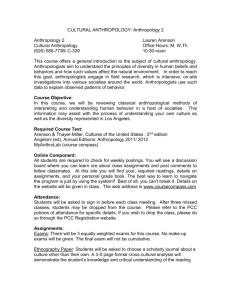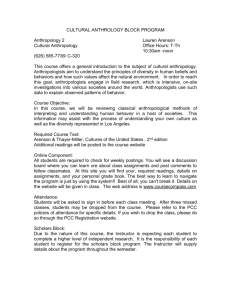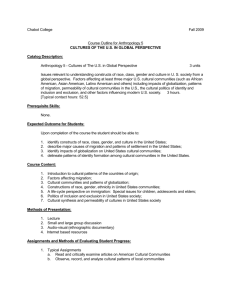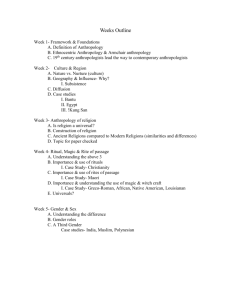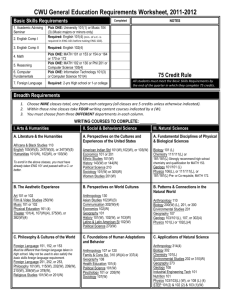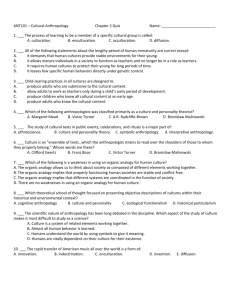GEOG260 Physical Geography
advertisement
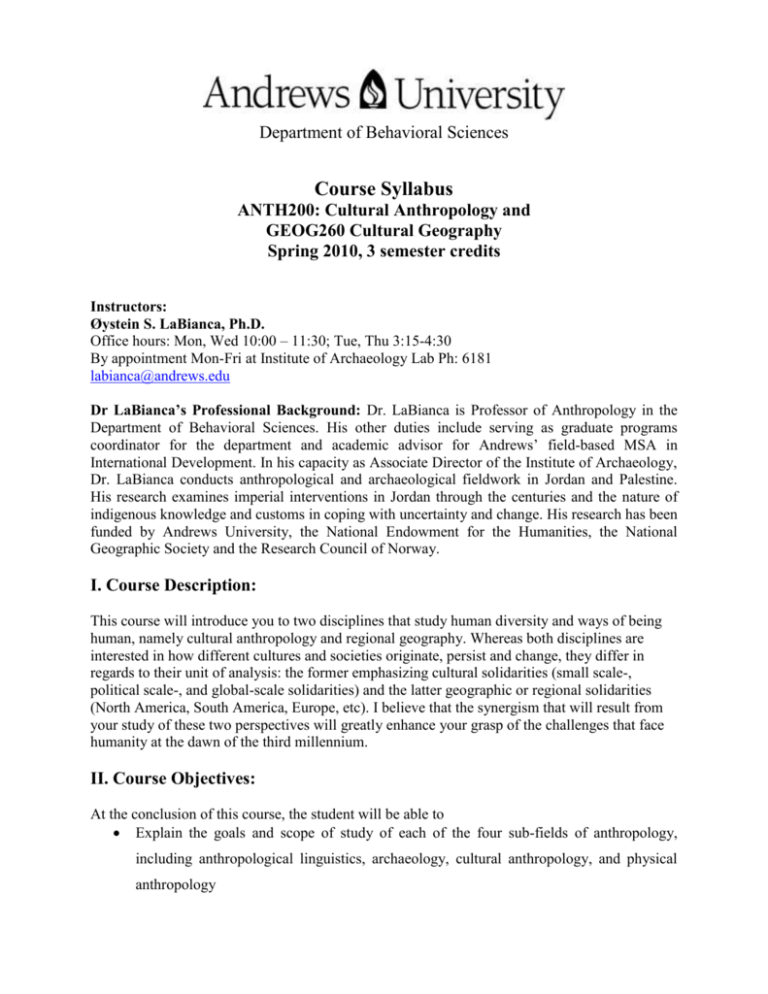
Department of Behavioral Sciences Course Syllabus ANTH200: Cultural Anthropology and GEOG260 Cultural Geography Spring 2010, 3 semester credits Instructors: Øystein S. LaBianca, Ph.D. Office hours: Mon, Wed 10:00 – 11:30; Tue, Thu 3:15-4:30 By appointment Mon-Fri at Institute of Archaeology Lab Ph: 6181 labianca@andrews.edu Dr LaBianca’s Professional Background: Dr. LaBianca is Professor of Anthropology in the Department of Behavioral Sciences. His other duties include serving as graduate programs coordinator for the department and academic advisor for Andrews’ field-based MSA in International Development. In his capacity as Associate Director of the Institute of Archaeology, Dr. LaBianca conducts anthropological and archaeological fieldwork in Jordan and Palestine. His research examines imperial interventions in Jordan through the centuries and the nature of indigenous knowledge and customs in coping with uncertainty and change. His research has been funded by Andrews University, the National Endowment for the Humanities, the National Geographic Society and the Research Council of Norway. I. Course Description: This course will introduce you to two disciplines that study human diversity and ways of being human, namely cultural anthropology and regional geography. Whereas both disciplines are interested in how different cultures and societies originate, persist and change, they differ in regards to their unit of analysis: the former emphasizing cultural solidarities (small scale-, political scale-, and global-scale solidarities) and the latter geographic or regional solidarities (North America, South America, Europe, etc). I believe that the synergism that will result from your study of these two perspectives will greatly enhance your grasp of the challenges that face humanity at the dawn of the third millennium. II. Course Objectives: At the conclusion of this course, the student will be able to Explain the goals and scope of study of each of the four sub-fields of anthropology, including anthropological linguistics, archaeology, cultural anthropology, and physical anthropology Explain what is meant by the concepts of culture, cultural diversity, ethnocentrism, culture scale, and globalisation Explain what’s involved in doing ethnography and the advantages of this type of research as a method of studying humans. Explain--based on reading of an ethnographic case study of the Hutterites on North America—how the way of life of these highly communally oriented people originated; how it persists; and how it is gradually changing. Explain the salient features of domestic-scale cultures as exemplified by three tribal cultures, including the Australian aborigines, the Native Amazonians and African cattle people Explain the salient features of political-scale cultures as exemplified by early states in the ancient Near East and Andes, and by the complex state-level societies of China, India and the Islamic world. Explain the salient features of commercial or global scale cultures as exemplified by the rise of capitalist and communist states in Europe and the American capitalist state. Explain the meaning and implications of globalization for the future of nation-states and for the environment. Explain how various world regions differ in regards to their salient cultural features and the challenges faced by populations within each. Explain how each of us as individuals can make a difference for the future of humanity by the life-styles we chose to adopt and promote. Explain our responsibility as Christians in responding to the challenges facing humanity and our planet in the future. III. Methods of Instruction: Methods of instruction include assigned readings, lectures, class discussions, writing assignments and a required field trip. There are two unit exams and a comprehensive exam at the end of the semester. Daily attendance is essential to good performance as assigned readings complement rather than duplicate topics covered in class lectures. IV. Course Requirements: Attendance: Daily attendance is required and will be recorded. You are expected to be on time for class and to be present not only in body, but also with your mind. You are welcome to eat your lunch in class as long as you bring enough food to share with all class members. Assigned Readings: Assigned readings are drawn from textbooks listed below. The daily course schedule below tells you what specific reading assignments are due at the beginning of each class period. Reflection Journal or Term Paper: You may choose to complete a reflection journal or a term paper. The completed journal consists of a minimum of about 25 entries. Each entry should be at least one hundred words and should represent your reflections on assigned readings as outlined below. If you chose to write a term paper instead, you will need to receive instructor approval for the topic before the end of the third week of classes. The term paper should consist of a minimum of 5000 words. It should represent your best effort at analysing an issue related to the subject of this class. Both are due Thursday two weeks before exams begin. ● Personal Network Project In accordance with instructions provided in exercise 16 (package), you are to reconstruct your personal social network. Report your results on pp 110-115 in your journal notebook. The project will be due for full credit last class day in January. Cultural Encounter Project In accordance with the instructions provided in class, you are to befriend an individual from a cultural background significantly different from your own and have him/her describe for you the nature of his/her social support system. On pp. 116-122 of your notebook describe your friend's social support system (including preparation of his/her friendship and kinship networks) and discuss how it contrasts with your own. Give your ideas about the reasons for this difference. The project will be due for full credit last class day in February. ANTH600 Seminar in Anthropology Graduate students enrolled in ANTH600 will be required to complete a term paper that examines the contribution of cultural anthropology to their field of study. For example, students studying for the MSA in International Development could explore the relevance of “indigenous knowledge” for international work. The term paper should be minimum 5000 words and is due at the end of the semester. Graduate students are not required to keep and turn in a reflection journal, though they should do the two projects. ● Exams: Three exams will be administered, two during the semester and one at the end. You are required to sit for all three exams as scheduled below. Of the first two exams, the one with the lowest grade will be discarded in calculating your final grade. Special Needs: If you have special needs related to a physical handicap, please see the instructor regarding any special assistance you may need. V. Grading Standards: Assignment Attendance Reflection Journal/Term Paper Projects First Two Exams Final Exam % 10 15 10 30 35 TOTAL 100 A AB+ B BC+ C CD F Grades will be assigned according to the following scale: 94 – 100 % 90 – 93 % 87 – 89 % 83 – 86 % 80 – 82 % 75 – 79 % 70 – 74 % 65 – 69 % 60 – 64 % 0 – 59 % VI. Assignment Submission: Reflection journals based on readings are due at the time of final exams It is the students responsibility to make sure the teacher gets his/her assignment VII. Academic Honesty: Students are expected to display honesty in all academic matters. Please review the Academic Integrity statement found in the University Bulletin for a complete description of what constitutes academic dishonesty along with the consequences for such academic behavior. VIII. Textbooks: John H. Bodley 2000 Cultural Anthropology: Tribes, States, and the Global System, 3rd ed. Mayfield Publishing Company John Hostetler and Gertrud Huntington 1980 The Hutterites of North America. Holt, Reinhart and Winston. IX. Course Outline: 01-05 Tue Introductory 01-07 Thu Introduction to Hutterite Case Study Hutterites: Introduction and ch 1 01-12 Tue Hutterite World View and Colony Pattern Hutterites: ch 2 - 3 01-14 Thu Hutterite Socialization and Family Pattern Hutterites: ch 4 -5 01-18 Mon MLK Events: Cultural Encounter Opportunity 01- 19 Tue The Challenge of Change and Disruption Hutterites: ch 6 -7 01-21 Thu Culture and Ethnocentrism Cultural Anthropology ch 1 Personal Network Project documented in notebook 01-26 Tue Domestic Scale Cultures: The Australian Aborigines Cultural Anthropology ch 2 first half 02-28 Thu Domestic Scale Cultures: The Australian Aborigines Cultural Anthropology ch 2 second half 02-02 Tue Domestic Scale Cultures: The Native Amazonians Cultural Anthropology ch 3 02-04 Thu Domestic Scale Cultures: African Cattle People Cultural Anthropology ch 4 02-09 Tue Domestic Scale Cultures: The Quality of Tribal Life Cultural Anthropology ch 5 02-11 Thu First Exam: covers lectures, assigned readings, videos and class discussion 02-16 Tue Political Scale Cultures: The Pacific Islanders Cultural Anthropology ch 6 02-18 Thu Political Scale Cultures: Early States: The Ancient Near East Cultural Anthropology ch 7 Cultural Encounter Project documented in notebook 02-23 Tue Political Scale Cultures: The Madaba Plains Project D2L Handout: Great and Little Traditions (LaBianca) 02-25 Thu 03-02 Tue Political Scale Cultures: The Chinese Great Tradition Cultural Anthropology ch 8 Political Scale Cultures: The Hindu Great Tradition Cultural Anthropology ch 9 first half 03-04 Thu Political Scale Cultures; The Islamic Great Tradition Cultural Anthropology ch 9 second half 03-09 Tue Political Scale Cultures: The Breakdown of States Cultural Anthropology ch 10 03-11 Thu Political Scale Cultures: Failed States Video D2L Handout: Failed States Index 03-12 Fri Begin Spring Break. Break ends Sun 03-22 03-23 Tue Political Scale Cultures: Capitalism and Ethnic Conflicts D2L Handout: World on Fire (Amy Chua) 03-25 Thu Second Exam: Covers lectures, assigned readings, videos and class discussion 03-30 Tue Global Scale Cultures: Europe and the Commercial World Cultural Anthropology ch 11 first half 04-01 Thu Global Scale Cultures: Rise of Modern World System Cultural Anthropology ch 11 second half 04-06 Tue Global Scale Cultures: The American Industrial State Cultural Anthropology ch 12 first half 04-08 Thu Global Scale Cultures: The American Industrial State Cultural Anthropology ch 12 second half 04-13 Tue Global Scale Cultures: The Impoverished Cultural Anthropology ch 13 04-15 Thu Global Scale Cultures: Indigenous Peoples Cultural Anthropology ch 14 04-20 Tue Global Scale Cultures: The Future in the Global Greenhouse Cultural Anthropology ch 15 Notebooks due for grading 04-22 Thu Review for final exam. Notebooks returned. 04-29 Thu 13:30-15:30 pm Comprehensive Final Exam: See course objectives
